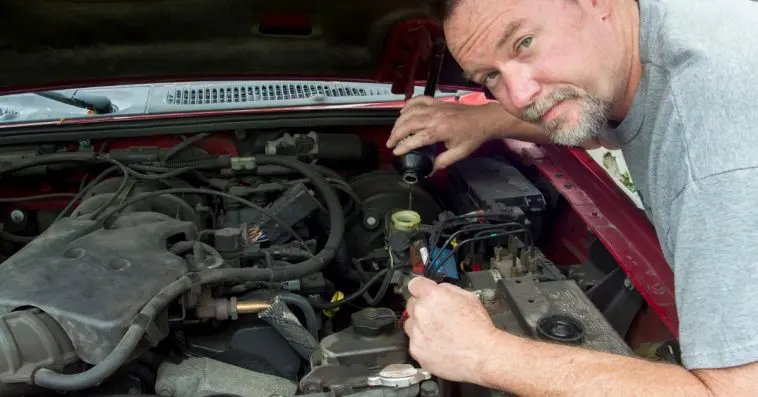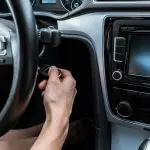A master cylinder is an essential component of your car’s braking system. It converts the mechanical pressure into hydraulic pressure when you press on the brake pedals.
Unless you understand what a master cylinder is and how it works, you may not know whether and when it needs replacement.
This article will take you through some of the nitty-gritty of a master cylinder and how to tell if it needs replacement or not. Let’s dive in, shall we?
TABLE OF CONTENTS
How Does A Master Cylinder Work?
When you press on the brakes, the master cylinder converts mechanical pressure into hydraulic pressure, which pushes a piston, supplying hydraulic fluid to each brake.
The pressure exerted on the rotor by the hydraulic liquid causes your vehicle to slow down or stop.
Types Of Master Cylinder
There are two significant types of master cylinders which are; single and dual reservoir master cylinders. Let’s look into the details of each type.
1. Single Circuit Master Cylinder
A single circuit master cylinder provides hydraulic pressure to both the front and the rear braking systems.
It’s the more straightforward type of braking system, and it uses a single-piston to distribute equal braking force to the four wheels.
This type of master cylinder is common among lightweight four-wheelers and two-wheelers.
2. Dual Circuit Master Cylinder
A dual circuit master cylinder is also known as a tandem master cylinder and is safer and more efficient than a single circuit master cylinder.
The master cylinder has a single-piston, and a single fluid reservoir internally partitioned to push brake fluid into the front and the rear brake lines for the vehicle to slow down or stop.
It also has two chambers, with each compartment being responsible for braking each set of wheels.
A dual circuit master cylinder is more advantageous than a single circuit because should one braking system fail, you can rely on the other one to stop the vehicle.
On the other hand, if a single circuit master cylinder fails, it means that your car won’t be able to stop and may jeopardize your safety and of others around you.
5 Symptoms Of A Bad Master Cylinder
Once you understand how the master cylinder works, you will be able to tell if it needs replacing or not. Some of the telltale signs of a failing master cylinder are:
1. Abnormal Brake Pedal Behavior
Under normal circumstances, your brake pedals should feel firm with every push.
If your brake pedals suddenly start to feel spongy or mushy, it could mean that your car’s master cylinder needs replacing.
Spongy brakes could be caused by air in the brake lines, which could interfere with even hydraulic pressure distribution.
You will require more effort and time to stop or slow your vehicle if the hydraulic pressure is lower than average.
Insufficient pressure may also be caused by leaking brake fluid due to damaged or rusty brake lines.
2. Brake Warning Lights
Illuminating the brake light on the dashboard is the easiest to notice, although it might not always mean that your master cylinder needs replacement.
If you see the braking light on your dashboard, it’s essential to have your vehicle checked by a qualified mechanic because it indicates a problem.
Brake warning lights could also show due to worn-out brake pads, and if the light goes on and off at intervals, it could mean low levels of brake fluid.
Your mechanic will check and tell you whether your master cylinder needs replacing or not.
3. Contaminated Brake Fluid
Brake fluid may get contaminated when moisture finds its way into the liquid, especially when you constantly drive under heavy braking conditions.
Moisture encourages rusting, which may degrade the brake fluid and turn its color to dark brown or black.
The brake fluid could also get contaminated during brake maintenance or when the master cylinder’s rubber seals wear or tear with time.
Worn-out rubber seals leave the brake fluid unprotected and vulnerable to contamination by water, dust, or debris.
Contaminated brake fluid may affect the hydraulic pressure making it not enough to slow down or stop your vehicle when you press on the brakes.
The scenario could put you and others at risk if your car fails to stop or slow down. You could ram into other vehicles and buildings or hit and injure pedestrians.
4. Sinking Brake Pedals
The brake pedals should come back to the top when you remove your foot. If you notice your car’s braking pedals sinking, it could be due to air in the brake lines.
Brake pedals may also drop due to leaking brake fluid or if the pedals are faulty or loose. Sinking brake pedals may fail to stop or slow down your vehicle and could put you and others in danger.
5. Low Levels Of Brake Fluid
For your car’s brake to function correctly, they need sufficient levels of brake fluid. Low brake fluid levels may interfere with how the brakes work and may cause them not to work at all.
Brake fluid levels will naturally go down with time due to wear and tear, but if they go down suddenly, it could indicate a problem.
Brake fluid levels may go down due to leakage, and you may not notice it unless you look keenly.
You will know if the brake fluid is leaking by looking for signs of fluid on your driveway or under the wheels. Check for signs of fluid under the dash or at the top of the brake pedals.
If you still can’t tell whether the fluid is leaking or not after performing the above procedures, get a qualified mechanic to check for you and fix the problem as soon as possible to prevent the fluid from running dry.
FAQs
Still have questions on the master cylinder? I have tried my best to answer some of them in the section below.
Q1. Can I Drive a Car With A Bad Master Cylinder?
It’s not safe to drive a car with a non-functional master cylinder because it may put you at risk should the braking system fail.
Your car’s brake fluid may be leaking, which could cause failed brakes and put you and others in danger should your vehicle fail to stop.
Q2. Is It Hard To Replace A Master Cylinder?
For most vehicles, it’s pretty easy to replace the master cylinder in your garage. Suppose you have the technical know-how and the necessary car experience.
In that case, you can unbolt the master cylinder from the firewall and disconnect the brake lines as you install a new master cylinder.
Q3. How Much Does It Cost To Replace A Faulty Master Cylinder?
The average cost of replacing a faulty master cylinder falls between $320 and $500. The cost of buying the equipment ranges from $100 and $210 and labor between $230 and $300.
If you have the necessary knowledge and experience, you can skip the labor cost and replace the master cylinder on your own.
However, it would help if you were careful to install it properly to ensure that it’s functioning normally to maintain your safety and those around you.
Conclusion
The Master cylinder is the most crucial component of your car’s braking system. A vehicle that cannot stop is a safety hazard to you and the people around you.
Your vehicle could cause serious accidents that could lead to death or permanent disability if the braking system fails.
It’s essential to understand your car’s master cylinder and how it works, and how to tell if it needs replacing or not.
Look out for signs such as low brake fluid levels, sinking brakes, abnormal brake pedal behavior, contaminated brake fluid, and most importantly, warning brake lights.
If you notice these signs, it’s time you replaced your car’s master cylinder. You can do it at home or in a local garage with the help of a qualified mechanic.




